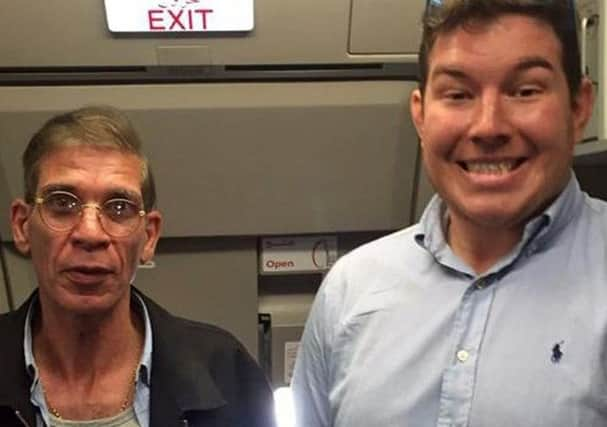Euan McColm: So what would you do on a hijacked jet?


Standing beside the man who had hijacked the plane on which he was a passenger, Ben Innes looks perfectly buffoonish. You’ll have seen the photograph by now, I’m sure: Seif al-Din Mustafa – the man who forced the pilot of EgyptAir flight MS181 to fly to Cyprus in an inevitably fruitless attempt to win back his ex-wife – wears what looks to me to be a fairly convincing (but later found to be fake) explosive belt and stares at the camera, the flicker of a smile on his lips. Flanking the kidnapper, Innes cracks the cheesiest of grins. He looks like a bloke who has just run into Keith Chegwin on a crazy golf course during a stag weekend in Morecambe rather than a man facing death at the whim of a terrorist
Innes, a 26-year-old health and safety auditor (who appears not to have followed procedures when it comes to approaching armed hijackers), has attracted a great deal of criticism for his actions. The journalist and broadcaster John Humphrys decried a “bizarre demonstration of vanity” while – and this is surely more troubling for Innes – his mother described his actions as stupid.
Advertisement
Hide AdAdvertisement
Hide AdI’m no fan, as a rule, of wacky japesters; let them board the banter bus without me. I’ll be fine back here. But I’m prepared to make an exception for Innes. Of course, the circumstances in which passengers on the flight hijacked by Mustafa found themselves must have been terrifying indeed, but it is possible both to respect the gravity of their experience and salute the silliness of Innes’s actions.
His request to pose for a keepsake snap with the hijacker was foolish, irreverent and inappropriate. Heroically, so.
In his ticking off, Humphrys wrote that the photo demonstrated perfectly a contemporary urge to be the star of one’s own social media show, taking place in an until recently unimaginable medium, the internet.
But weren’t Innes’s actions of the type that long predate the internet? Wasn’t he displaying the sort of defiant foolishness which we all use to get through difficult situations? The internet simply provides a new way for that laughter in the face of adversity to be expressed.
Before anyone gets too high and mighty over Innes’s behaviour, they should ask themselves whether they’ve ever reacted “inappropriately” during a difficult moment. Helpfully, this question demands we set out precisely what behaviour is to be deemed appropriate.
We have all, I’m sure, faced some sort of adversity and we have all, I’m equally sure, reacted in our own ways. Which of us hasn’t laughed at a black joke as we wait outside a crematorium or failed to stifle a nervous laugh at precisely the wrong moment during a friend’s tale of misery and woe? As I waited with close family for a car to take us to my late father’s funeral, we were sustained by often cruel jokes about long-lost relatives we were sure to see. Just a few months ago, as I left a crematorium after the funeral of an especially garrulous chum, a mutual friend noted that it was as well the deceased wasn’t with us or nobody would have got home in time for dinner.
There are few more powerful anaesthetics than laughter.
An air hostess who posed with Mustafa before Innes seized the opportunity to have his meeting with the hijacker preserved was later said to have been doing so in order to send the images to investigators in both Egypt and Cyprus, but Innes had no such motivation. He was “trying to stay cheerful in the face of adversity”.
In 2009, Barry Delaney found fleeting fame for a demonstration of defiant silliness during a time of trauma when he attended the funeral of his best mate Kevin Elliott, wearing a skin-tight, lime-green mini-dress and bright pink, knee-length socks.
Advertisement
Hide AdAdvertisement
Hide AdElliott was a soldier serving in Afghanistan and he and his friend had agreed one evening that should the worst happen, he would turn up to mourn in the gaudiest frock he could find. When Elliott was killed in a Taleban ambush, Delaney kept his promise. In those days, I shared pages with a columnist who was far from alone in thinking his actions offensively inappropriate. There was a way for a chap to dress to a funeral and lime-green mini-dresses weren’t involved.
Of course, this criticism missed the most important point that one friend was carrying out the other’s wish. Delaney’s decision to wear the dress was a gesture of loyalty, the type of which we’d all be lucky to find in another.
But, beyond that point, there is the wider issue of what appropriate behaviour actually is. Life is not like an afternoon movie where moments of sorrow or loss are lived through tasteful montages of glances through rain-spattered windows and cushion-hugging naps on the sofa. We react to shocking news in ways that surprise us, we behave “inappropriately” all the time.
There has been some muttering that Innes could find himself in trouble with his employers over the photograph. This would be deeply unfair.
For one – perhaps the most obvious – thing, the man’s just been involved in a hijacking and, in the scheme of things, he’s probably earned a bit of slack. And, anyway, which company’s code of conduct has guidelines on representing one’s employer during a hostage situation? That’s surely an instance when one might be expected to act on one’s own initiative.
What began as a terrifying hijacking in Egypt ended like something from an Ealing comedy, with a fool for a mastermind at the heart of the chaos.
Innes looked potential death in the face and saw the opportunity to make his mates laugh. His foolishness is the best of us. When life takes a difficult turn, playing the fool is often the best thing one can do.
Here’s to Ben Innes: idiot; banter merchant; hero.